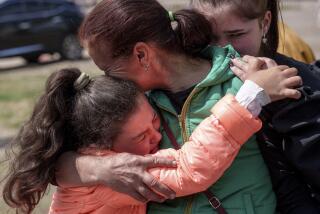Sadr loyalists quit Iraq Cabinet
- Share via
BAGHDAD — Radical Shiite Muslim cleric Muqtada Sadr reasserted his political power Monday by yanking his loyalists from the Iraqi Cabinet, a move aimed at showing supporters he retains his credentials as an opposition leader.
By ordering the six Cabinet ministers to quit, the Shiite cleric increased the pressure on Prime Minister Nouri Maliki to loosen his embrace of the U.S. military presence, which many Iraqis blame for violence in the country. Sadr also distanced himself enough from Maliki to reassure loyalists displeased with his low profile since the U.S. troop escalation began mid-February.
The Sadr bloc will retain its 30 parliament seats, and members said they would remain part of the ruling Shiite alliance that includes the prime minister’s party.
But their walkout from the Cabinet sent a clear signal of growing dissatisfaction with Maliki at a time when he is also under pressure from the Bush administration to produce legislative results aimed at calming sectarian strife.
“Maliki may no longer have any real support. After all, it was the Sadrists who brought him to power,” said Joost Hiltermann, an Iraq expert at the International Crisis Group in Amman, Jordan.
Sadr’s move, however, could free Maliki to work more aggressively with U.S. forces to crush the cleric’s Al Mahdi militia, Hiltermann said.
The Cabinet walkout also comes as Maliki is trying to bolster confidence in the U.S.-Iraqi security plan, now in its third month. Massive car bombings and other attacks continue unabated in the capital, and violence appears to be increasing in other areas.
Most of the attacks are blamed on Sunni Arab insurgents, and the majority of the victims have been Shiites.
Bombs, mortar rounds and gunfire in the capital Monday killed at least six Iraqi civilians, and police reported finding the bodies of 11 men, apparent victims of death squads, across the city overnight.
In northern Iraq, gunmen killed 13 Iraqi soldiers at a checkpoint near Hadar, about 70 miles southwest of Mosul. In the insurgent stronghold of Al Anbar province, west of Baghdad, U.S. troops shot to death three Iraqi police officers amid confusion during a raid on a suspected Al Qaeda in Iraq network, the military said.
A U.S. military statement said American forces returned fire after they came under attack from gunmen in two buildings during the operation outside the provincial capital, Ramadi.
They later learned that the three men killed were Iraqi police officers.
U.S. troops had been told there were no Iraqi police in the area, the statement said.
“We do everything we can to reduce risk to friendly forces,” a military spokesman, Army Lt. Col. Christopher Garver, said later.
Seven suspected terrorists were arrested, the military said.
The military also reported the deaths of seven U.S. troops, bringing to at least 3,308 the number of American troops killed in Iraq since the U.S.-led invasion in March 2003, according to icasualties.org, which tracks war-related casualties. Five died Monday: three soldiers in separate incidents in Baghdad and two Marines in Al Anbar, the military said. Two Marines died Saturday when a bomb exploded near their vehicle in Fallouja, also in Al Anbar, according to the statement.
The Sadr bloc had been threatening the Cabinet walkout for several days amid a showdown that began April 9, when thousands of the cleric’s supporters rallied in Najaf to demand the ouster of U.S. forces. The next day, Maliki reiterated his support for the American presence.
Sadr’s loyalists insisted Monday that they were acting out of concern for the country, not out of political self-interest. Ghufran Saidi, one of the bloc’s lawmakers, blamed U.S. policies for creating a Cabinet chosen on sectarian lines.
“We hope the other blocs will do what we have done and set aside their personal interests. We want to be the first to start on a path free of sectarian quotas,” Saidi said.
One of the departing ministers, Saad Hashimi, whose portfolio was provincial affairs, said the walkout would not weaken the government at a crucial time.
“We want to strengthen the government, not weaken it,” he said, adding that the move would force Maliki to replace unproductive ministers.
“Quotas have led to some weak ministries, so we are giving the prime minister an opportunity to choose the best people,” he said, refusing to say which ministries he thought were weak.
The Sadr bloc has staged brief walkouts before, but this one has the potential to cause more damage by tying up the Maliki government as it is under pressure from the Bush administration to meet political benchmarks aimed at quelling sectarian disputes.
“If we do not get political accommodation ... among the major Iraqi political groups on the big issues, then there is no hope of turning Iraq around, and all our troops are doing is delaying an inevitable disaster of descent into much larger scale civil war,” said political analyst Larry Diamond, who served as an advisor in 2004 to the U.S.-led Coalition Provisional Authority, which governed Iraq after the invasion.
*
Times staff writer Suhail Ahmad, special correspondent Ruaa Al-Zarary in Mosul and special correspondents in Baghdad contributed to this report.
More to Read
Sign up for Essential California
The most important California stories and recommendations in your inbox every morning.
You may occasionally receive promotional content from the Los Angeles Times.











